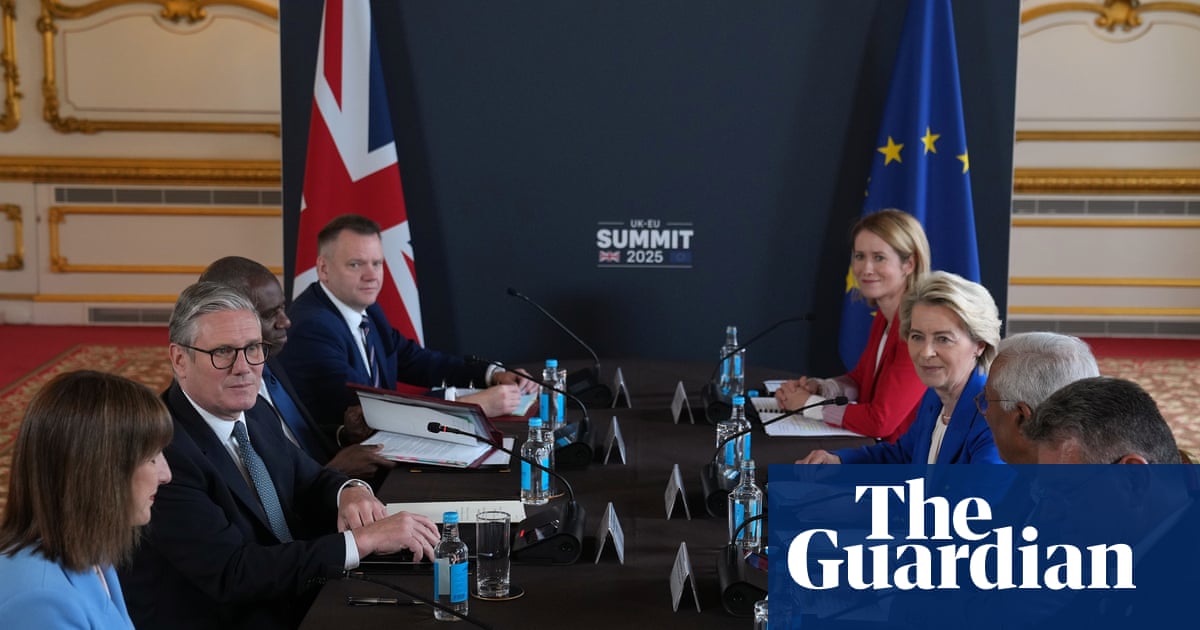Monday’s EU-UK reset deal will not instantly produce the growthLaboursorely needs to fulfil its promise to voters, but ministers hope it marks another step on the road to a more positive economic future.
Three aspects of the agreement have been particularly welcomed by business, and form the core of the economic package – although many details remain to be negotiated.
The first is the long-hoped-for agreement to create a common sanitary and phytosanitary (SPS) area, under whichcumbersome checks on food and agricultural productswill be lifted in return for the UK aligning with EU standards in these areas.
Boris Johnson, presentinghis trade and cooperation agreement with the EUon Christmas Eve 2020, wrongly claimed there would be “no non-tariff barriers to trade”.
In practice, these barriers – including veterinary checks – have been hugely damaging, and a SPS deal is aimed at dismantling some of them, for this key sector.
The British Chambers of Commerce, which has long drawn attention to the frustrations suffered by UK exporters, called the prospect of an SPS agreement “a huge boost” that would “cut costs, reduce waste and increase sales”.
In a clearer statement of the hit to exports fromBrexitthan the ever-cautious Labour has usually allowed itself, the press release accompanying the deal mentions “the 21% drop in exports and 7% drop in imports seen since Brexit”. Enthusiasts for a closer economic relationship hope that this approach – aligning on rules in exchange for more frictionless market access – could be a model for other sectors in future.
The second aspect of the deal that carries economic weight is an agreement to cooperate more closely on energy policy, including aligning the EU and UK emissions trading schemes.
The agreement should, the government says, “create the conditions for goods originating in our jurisdictions to benefit from mutual exemptions from the respective EU and UK carbon border adjustment mechanisms (CBAM)”.
In practice, the UK government claims that will mean the steel industry escapes £25m a year in levies that the EU would otherwise have imposed, via the CBAM – a policy aimed at ensuring heavily polluting products cannot enter the EU and undercut domestically produced equivalents that have paid to offset their emissions.
Third, the UK hopes the agreement to negotiate over the possibility of defence industry cooperation will mean UK firms being able to bid for projects procured via the planned EU Security Action ForEurope(SAFE) fund, which will allow member states to borrow to pay for weapons.
The language on thisin the EU-UK agreement is scant: the two sides agree to cooperate on “security and defence initiatives, including on defence industry”, and they commit to “swiftly explore any possibilities for mutually beneficial enhanced cooperation created by the SAFE instrument”.
But ministers clearly believe this could open the way for UK defence companies such asBAE Systemsto profit, as defence spending ramps up on both sides of the Channel.
The fury about fishing rights, whichheld up the final agreement, has little to do with economics and everything to do with the political symbolism of the sector.
Research by the Resolution Foundation found that fisheries had actually been one of the industries worst affected by Johnson’s Brexit deal, with output perhaps 30% lower than it might otherwise have been.
Sign up toBusiness Today
Get set for the working day – we'll point you to all the business news and analysis you need every morning
after newsletter promotion
Given how rapidly fish needs to get to market, Labour argues that eliminating cumbersome food checks under the SPS deal will benefit the sector more than allowing EU boats access to UK waters for another 12 years. (It may also have the positive political side-effect of preventing regular rows about fish from spilling out into the headlines.)
While the UK can point to clear economic wins from the deal, economists believe its direct impact on GDP growth is likely to be small, given the government’s clear determination not to rejoin the single market or customs union, to avoid having to sign up to the free movement of people.
Nevertheless, the governmentclaimsthe reset will “help make food cheaper, slash red tape, open up access to the EU market and add nearly £9bn to the UK economy by 2040”. That’s a modest but worthwhile boost of about 0.3% to GDP, over the next 15 years.
John Springford of the Centre for European Reform, whose analysis suggests the UK economy is approximately 5% smaller than it would otherwise have been as a result of Brexit, suggests that it still looks relatively generous.
Herecently forecastthat a generous youth mobility scheme might increase the size of the economy by 0.45% over the next decade, while an SPS agreement would add less than 0.1%, for example – making 0.3% look a stretch.
However, Labour hopes the economy will gain something more nebulous, which it is harder to plug into a model: a growing acknowledgment from the business sector that the UK is an appealing investment proposition.
Before coming to power, Rachel Reeves and Keir Starmer hoped the credibility of a steadier hand on the tiller than the Tories would win over investors, whose confidence they see as key to the UK’s recovery.
Instead, Labour swept into power on a wave of dire warnings about the state of the economy, blindsided businesses with tax rises, and saw GDP continue to flatline.
Now, they hope the triumvirate of theIndia-UK trade deal, theUS tariff agreement with Donald Trumpand the EU reset will burnish their reputation as calm and competent stewards of the economy, helping to generate a glimmer of optimism, in a highly uncertain world.
